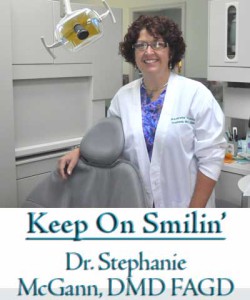Dental hygienists are the first line of defense in dental health
By Dr. Stephanie McGann, DMD FAGD, Columnist, The Times
 Too often in the closely scheduled day in dental practice we neglect to thank those people who we really can’t do without. The modern dental practice depends heavily on the services provided by registered dental hygienists.
Too often in the closely scheduled day in dental practice we neglect to thank those people who we really can’t do without. The modern dental practice depends heavily on the services provided by registered dental hygienists.
A great dental hygienist is a tremendous advocate for patient health. I have been pleased to work side by side many of these well trained professionals. In Pennsylvania a dental hygienist must be a graduate of a two or four year dental hygiene program, pass a licensing exam and maintain a PA state license to practice dental hygiene. Their scope of practiced is dictated by the PA State Dental board. While some hygienists can apply for a public health license to provide some preventive services independent of a dentist, most dental hygienists work alongside a dentist in a private practice setting.
What exactly does a hygienist do?
The dental hygienist can provide a screening to evaluate basic dental health; they can review the medical history and work together with the dentist when educating a patient about their dental health and any concerns. That’s not all, in addition to a standard dental cleaning; a dental hygienist is licensed to provide initial therapies for the treatment of gum diseases. If a patient is diagnosed with gingivitis or periodontal disease the dental hygienist may be the first person to provide care. A great dental hygienist will take the time to show a patient the best ways to keep their mouth healthy. Most hygienists can provide fluoride therapies, dental sealants, take impressions for sports guards and perform some whitening services. The biggest service a great hygienist provides is the ability to answer questions about dental health and wide range of dental treatments. The dental hygienist is the RN of the dental care team.
Now I would be remiss not to have a list of things to do (or not to do) to make your hygienists job a little nicer.
1. Don’t blame your hygienist – if your gums are bleeding when he or she is cleaning your teeth, you probably have a concern, or really don’t floss as often as you told us you do.
2. Eating Oreo’s and raisins in the reception room immediately prior to your appointment – that’s mean don’t do it.
3. If your teeth are sensitive, let us know, we have treatments to help prevent dental hypersensitivity during a hygiene visit.
4. If you are pleased with the work done by the hygiene staff, tell the dentist. If there is a concern, tell the dentist. Feedback is vital for any business and for a small word of mouth business like a dental practice it is crucial.
5. Listen to the instructions your hygienist gives you. The healthier your mouth is, the easier the dental professional’s job is. Your hygienist does not (repeat does not) get a kick-back from the floss company.
6. Don’t keep him or her waiting – be punctual. A hygienist is scheduled throughout her day and when one person is late, it makes the rest of the day more difficult. Be kind – be on time.
It’s easy to forget that a dental hygienist is a licensed provider of care. As dentists we often take them for granted, today I am standing up and saying – thank you. I would welcome comments to this article with ways our hygienists can make their patient’s day a little better!
Dr. Stephanie McGann, who has more than two decades of dental practice experience, is a resident of the Unionville area and along with her partner, Dr. Marie Scott, operates The Brandywine Smile Center, a family-friendly dental practice in Concordville. Dr. McGann has opened a new practice in Valley Township, Rainbow Valley Dental. She is a Fellow of the Academy of General Dentistry.




